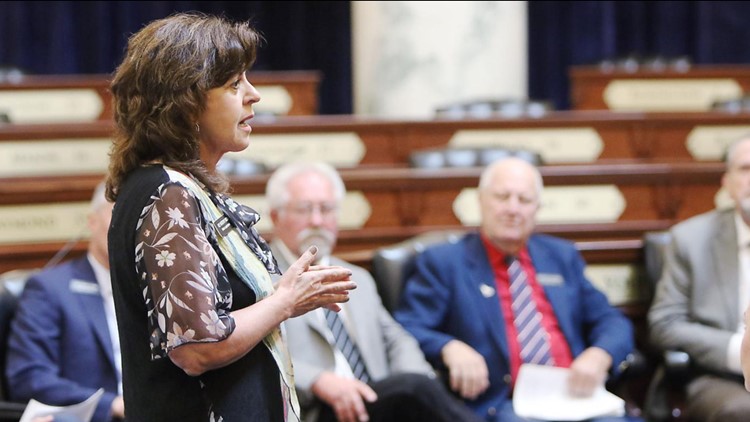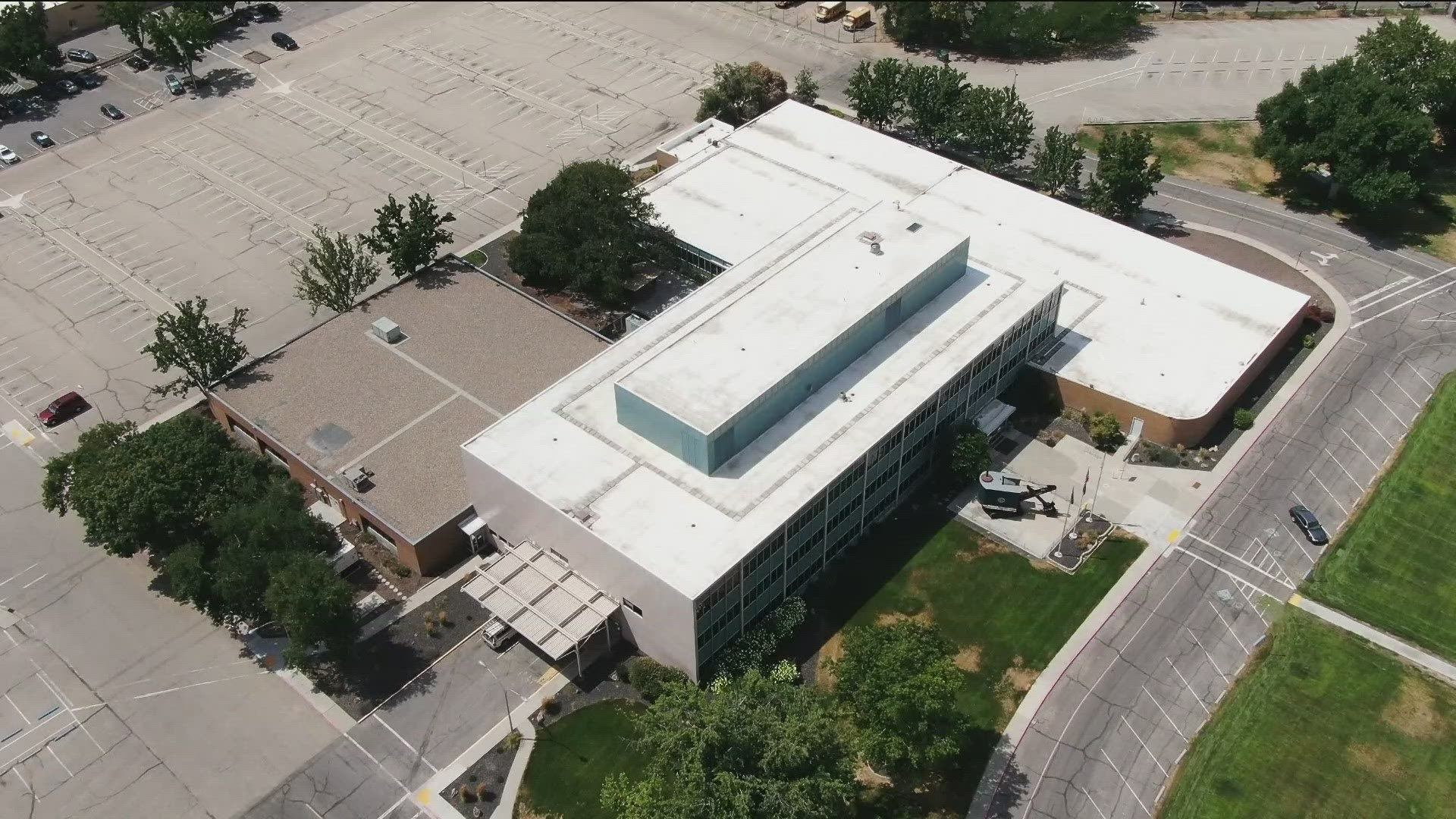BOISE, Idaho — This article originally appeared in the Idaho Press.
Legislation introduced this week by a candidate running to become Idaho’s next top election official would have an unintended consequence: Removing Idaho’s distinction as one of just six states that’s exempt from a 1993 federal law, the National Voter Registration Act, that imposes numerous federal requirements on state election systems.
Among them: Idaho would have to have “motor-voter” provisions offering voter registration to Idahoans whenever they register their vehicle; register people to vote whenever they interact with an array of other state agencies including the Department of Health and Welfare; never cull its voter registration lists for non-voting, and more.
Rep. Dorothy Moon’s bill, HB 549, would end Election Day voter registration, which she claimed in a press release is “a policy crafted by liberal interest groups that has led to increased fraud and ballot manipulation.” The Idaho Legislature enacted the policy in 1994 at the urging of then-Chief Deputy Secretary of State Ben Ysursa and the late GOP Secretary of State Pete Cenarrusa, and it was supported by every Republican in both houses, passing nearly unanimously. That’s what qualifies Idaho for exemption from the 1993 federal law.
The only vote against the bill in either house came from the late Democratic Rep. Ken Robison, D-Boise, who wanted it expanded to include city elections; the next year, it was.
“My pitch to the Legislature was that this was an insidious federal intrusion into the state election process and we needed to get out of it,” Ysursa told the Idaho Press. “We felt Idaho knows the best way to handle Idaho’s elections.”
Among other concerns, Ysursa noted that Idaho purges voters from its voter registration list if they don’t vote for four years; the NVRA forbids any such purging, allowing voters to be removed from the list only if they die or move out of the state or jurisdiction.
“A lot of folks are canceled for not voting,” Ysursa said. “The NVRA didn’t allow that. … Having a good, accurate list is a challenge, and certainly being able to cancel people for not voting is one way to do that. … But we wouldn’t be able to do that. If this bill passed, it would put us back under the federal legislation.”
Ysursa served as deputy Idaho secretary of state from 1974 until 2002, and then was elected as a Republican as Idaho’s secretary of state with 77.5% of the vote, and served three terms before his retirement in 2015.
“We’re exempt from the federal law because we don’t like the feds telling us what to do,” said Ysursa, who drafted the 1994 bill, HB 603, and calls it his “foster child.”
“I think that’d be a pretty common theme in our current Legislature, so they need to know that and be informed,” he said.
Moon, a third-term state representative who’s one of three announced Republican candidates to be Idaho’s next secretary of state, is calling her bill the “Secure Election Act” and touted it on her campaign website.
In addition to ending Election Day voter registration, the bill proposes an array of changes to Idaho’s election laws, including removing the ability of a voter to sign an affidavit in lieu of showing official identification and instead setting up a new “provisional ballot” system; removing student ID as an acceptable form of identification at the polls; requiring proof of U.S. citizenship to register to vote; and more.
Moon told the Idaho Press late Wednesday, "I'm going to be making a few changes to it, and I'm not going to talk about what those changes are now."
She said the same-day registration provision was included "because that was a concern that I heard from a lot of my constituents and folks around the state as I've been traveling the state."
She told the House State Affairs Committee she worked with Theo Wold, “an attorney who served on President Trump’s election integrity committee,“ and “he’s got a lot of experience and has helped make sure that we’ve crossed our T’s and dotted our i’s.” She urged support for “this wonderful bill that deals with the Secure Election Act and making our elections much safer and fairer in the state of Idaho.”
Asked by a committee member for an example of something that’s happened in an Idaho election that her bill would fix, Moon said, “I cannot give you any example personally. … Just the idea that it does happen, whether it’s happened in Idaho, we don’t want it to.”
Moon’s comment in her press release about the origin of same-day voter registration marks the second time in two weeks that she’s made false statements to support her position on legislative issues. On Jan. 31, she told the House Education Committee and State Board of Education President Kurt Liebich she’d personally seen evidence of critical race theory in a local school district preschool program, something local school officials categorically denied. “I worked with one of those cohorts down in Boise County, and I did see the curriculum that was being brought in and it was very much CRT,” Moon said during an Education Committee meeting.
Basin School District Superintendent Brian Hunicke, in a Feb. 2 letter to the committee, called that “disinformation,” and wrote, “The last time Rep. Moon came on the Basin SD campus was in 2019 to donate a step award to Basin Elementary … The Basin Elementary principal has invited Rep. Moon to come to the school to view the preschool curriculum numerous times, but neither Rep. Moon nor anyone else has requested to view the district’s preschool curriculum. Rep. Moon did not meet with a Basin education cohort.”
He also wrote that none of the three school districts in Boise County is using materials regarding critical race theory in its preschool curriculum, and the superintendents of the other two told him “they, too, have not had any contact with Rep. Moon.”
Idaho Press news partner KTVB reported on Moon’s CRT comments and the reaction they stirred, including from a visibly upset fellow GOP representative who sat next to her at the hearing, Rep. Julie Yamamoto, R-Caldwell. Yamamoto, a former teacher, told KTVB she was concerned that Moon was repeating a debunked allegation about Idaho schools, and “doubling down on it by bringing it back up again this year as if it was still a thing.”
KTVB reported that Moon didn’t respond to multiple requests for comment; on Wednesday afternoon, Moon told the Idaho Press, "I'm not going to respond to it. ... It was just misconstrued."
On the election bill, Ysursa said, “I don’t know what’s going to happen to this bill later on. … As obviously a concerned private citizen that worked on the bill quite a bit … I think not just the Legislature but everybody should know what was behind the bill and the consequences of this bill, if Idaho no longer becomes exempt.”
During hearings on the 1994 bill, officials from the Idaho Department of Health and Welfare said without Ysursa’s bill, the department would have to “address the registration process over 300,000 times during the course of a year,” according to committee minutes.
Moon is one of three announced GOP hopefuls for Idaho secretary of state; the other two are state Sen. Mary Souza, R-Coeur d’Alene, and current elected Ada County Clerk Phil McGrane. Ysursa is McGrane’s campaign chairman.
When the Idaho Press contacted Ysursa about the history of the same-day registration provision, he said, “Because it’s Moon’s bill, I don’t want people to think, ‘You’re in it because of Phil McGrane.’ … This has to do with my ‘foster child,’ the way we got out of the NVRA.”
According to the Civil Rights Division of the U.S. Department of Justice, the requirements of the NVRA apply to 44 states and the District of Columbia. In addition to Idaho, Minnesota, New Hampshire, North Dakota, Wisconsin, and Wyoming are exempt because they either have no voter-registration requirements (only North Dakota falls in that category), or allow voter registration at polling places.
This article originally appeared in the Idaho Press, read more on IdahoPress.com.
Watch more Idaho politics:
See all of our latest political coverage in our YouTube playlist:



